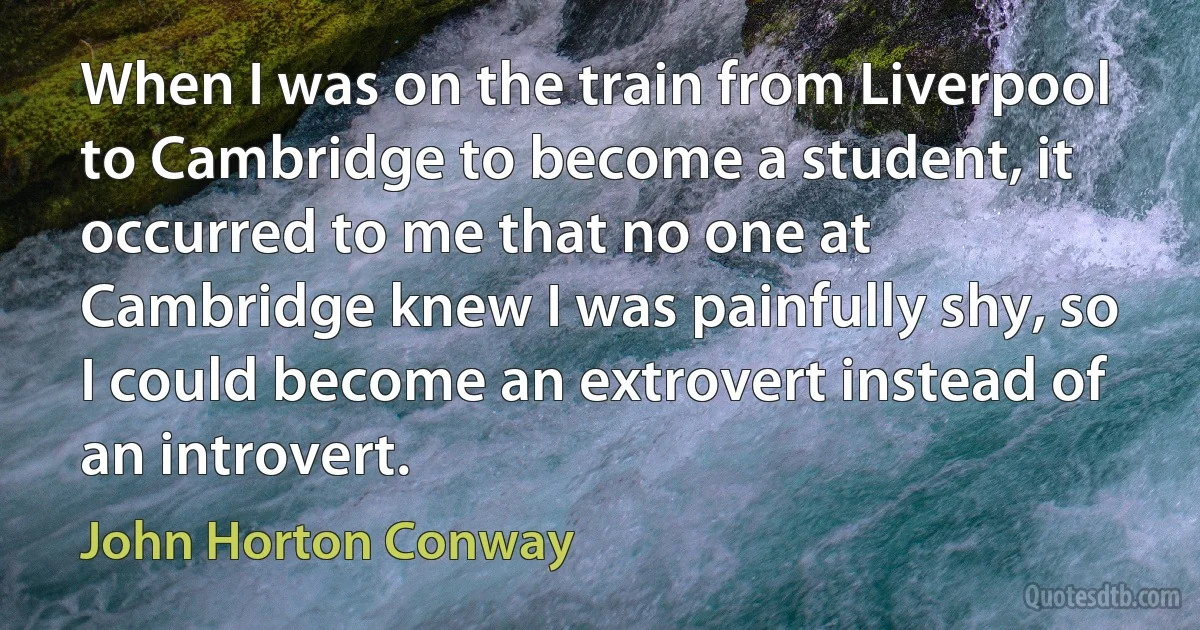Cambridge Quotes - page 5
Since my education, I've done quite untraditional things. There are very few Etonians who went to Rada. And far fewer Etonians - certainly when I was there - went to Cambridge. I don't know whether it's the same now. Most people I knew went to Oxford, because it seemed more of an easy bridge.

Tom Hiddleston
On the May 10 2006, edition of Fox New's The Big Story, after the release of a letter from Iranian President Mahmoud Ahmadinejad to U.S. President George W. Bush, Gibson compared the letter from the Iranian President to talking points and positions by Democrats. Gibson said, "Terry McAuliffe and the other Democrats should pay close attention to their talking points these days. That nut job running Iran, President - let's see if I can pronounce it - Ahmadinejad, sent President Bush a letter, and if it weren't postmarked Tehran, it might have been mistaken for a crank letter from an angry leftist in L.A. or Boulder or Cambridge, Massachusetts. Christians are not acting like Christians, says the Iranian president. Democrat talking point. WMD lies, says the Iranian president. Democrat talking point. Human-rights abuses in Gitmo. Another Democrat talking point. The gap between haves and have-nots. The Iranian president and the Dems in lockstep on that one, too."

John Gibson (media host)
Fifty years ago, when Europeans and Americans still distinguished high culture from popular culture, and when classical learning was still highly esteemed in colleges and universities, C. P. Snow delivered his famous Rede Lecture at Cambridge University, "The Two Cultures and the Scientific Revolution." Snow did more than warn of the growing split between the old culture of the humanities and the rising culture of science. He took Britain's literary aristocracy to task for its dangerous dismissal of scientific and technological progress, which Snow believed offered the solutions to the world's deepest problems. In a vitriolic response to Snow, the literary critic F. R. Leavis defended the primacy of the humanities for a civilizing education, insisting that science must not be allowed to operate outside of the moral norms that a first-rate humanistic education alone could provide.

Leon Kass
I very well remember Hayek's visit to Cambridge on his way to the London School. He expounded his theory and covered a black-board with his triangles. The whole argument, as we could see later, consisted in confusing the current rate of investment with the total stock of capital goods, but we could not make it out at the time.

Friedrich Hayek
In my third year at Cambridge, I devoted myself consciously to the Great Work, understanding thereby the Work of becoming a Spiritual Being, free from the constraints, accidents, and deceptions of material existence.
I found myself at a loss for a name to designate my work, just as H. P. Blavatsky some years earlier. "Theosophy", "Spiritualism", "Occultism", "Mysticism", all involved undesirable connotations.
I chose therefore the name.
"MAGICK"
as essentially the most sublime, and actually the most discredited, of all the available terms.
I swore to rehabilitate
MAGICK,
to identify it with my own career; and to compel mankind to respect, love, and trust that which they scorned, hated and feared. I have kept my Word.

Aleister Crowley
From the Colchester Grammar-School, when eighteen years of age, he went, in 1819, to Trinity College, Cambridge. Three years afterward he was elected to a scholarship. In 1823, on his graduating B. A., young Airy came out as Senior Wrangler. In 1824 he obtained his fellowship at Trinity. His degree of M. A. was taken in 1826, and he was simultaneously elected, though only then in his twenty-fifth year, as Lucasian Professor at Cambridge. Illustrious philosophers like Barrow and Newton had preceeded him... Latterly, however, the office had become, in a great measure, purely honorary, and might also be said to have degenerated into a sinecure.

George Biddell Airy
The Illustrated Review... to which we are indebted for the preceding statements, remarks that, since the death of Sir John Herschel... Sir George Airy, the Astronomer Royal, is the admitted master of the sublime science. There are other eminent English astronomers-as John Hinde, the discoverer of many asteroids, and John Adams, also a Cambridge Senior Wrangler and the rival of Urban Leverrier, who groped his way by mathematical calculation to the discovery of the hitherto unknown planet Neptune. If incidents as brilliant and remarkable as these are wanting in the history of Sir George Airy, his claims to respect are equally valuable, solid, and enduring.

George Biddell Airy
The philosopher John Toland, in the early 18th century, insisted that the terms 'Spinozism' and 'pantheism' are synonymous. Toland says that "Moses was, to be sure, a Pantheist, or, if you please, in more current terms, a Spinosist", while Spinoza's pantheism was taken for granted by Moses Mendelssohn, Gotthold Lessing and Friedrich Jacobi, in their famous Pantheismusstreit of 1785. More recently, this interpretation also appears in both the scholarly literature and popular representations of Spinoza's thought. In the recently published Cambridge Dictionary of Philosophy we read that "Spinoza is the most distinguished pantheist in Western philosophy". But the problem with calling Spinoza a 'pantheist' is that pantheism is still a kind of theism.

Baruch Spinoza
I would therefore abolish the monarchy and House of Lords, dispossess ... the public schools and Oxford and Cambridge; end the regimental system in the army ... disestablish the Church; replace the Inns of Court ... abolish the Honours List. What is more, we should take the offensive on all these fronts simultaneously: for if the apostles of social change eschew violence, they must embrace speed. Our society is a many-headed hydra: it is no use chopping off the heads singly, for while you are dealing with the second or third, the first will grow again.

Paul Johnson



